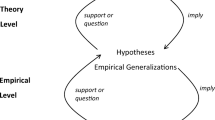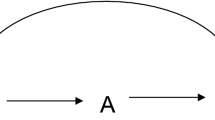Abstract
One of the main line of responses to the infamous causal exclusion problem has been based on the counterfactual account of causation. However, arguments have begun to surface to the effect that the counterfactual theory is in fact ill-equipped to solve the exclusion problem due to its commitment to downward causation. This argumentation is here critically analysed. An analysis of counterfactual dependence is presented and it is shown that if the semantics of counterfactuals is taken into account carefully enough, the counterfactual notion of causation does not need to be committed to downward causation. However, it is a further question whether this is eventually enough to solve the exclusion problem for the analysis shows how the problem itself can take various different forms.




Similar content being viewed by others
Notes
References
Andersen, P. B., Emmeche, C., Finnemann, N. O., & Christiansen, P. V. (Eds.). (2000). Downward causation: Minds, bodies and matter. Århus: Aarhus University Press.
Bechtel, W., & Mundale, J. (1999). Multiple realizability revisited: Linking cognitive and neural states. Philosophy of Science, 66, 175–207.
Campbell, D. T. (1974). Downward causation in hierarchically organised biological systems. In F. J. Ayala & T. Dobzhansky (Eds.), Studies in the philosophy of biology: Reduction and related problems. London/Basingstoke: Macmillan.
Gibbons, J. (2006). Mental causation without downward causation. Philosophical Review, 115, 79–103.
Haug, M. C. (2011). Review of Emergence in Mind, ed. C. MacDonald & G. Macdonald. Analysis, 71, 783–785.
Kim, J. (1989a). Mechanism, purpose and explanatory exclusion. In Tomberlin (Ed.), Philosophical perspectives: Philosophy of mind and action theory, (Vol. 3, pp. 77–108). Atascadero, California: Ridgeview.
Kim, J. (1989b). The myth of nonreductive materialism. Proceeding and Addresses of the American Philosophical Association, 63, 31–47.
Kim, J. (1998). Mind in a physical world: An essay on the mind-body problem and mental causation. Cambridge, MA: MIT Press.
Kim, J. (2005). Physicalism, or something near enough. Princeton: Princeton University Press.
Lepore, E., & Loewer, B. (1987). Mind matters. Journal of Philosophy, 84, 630–642.
Lepore, E., & Loewer, Barry. (1989). More on making mind matter. Philosophical Topics, 17, 175–191.
Lewis, D. K. (1973a). Causation. Journal of Philosophy, 70, 556–567.
Lewis, D. K. (1973b). Counterfactuals. Cambridge MA: Harvard University Press.
Lewis, D. K. (1979). Counterfactual dependence and time’s arrow. Noûs, 13, 455–476.
List, C., & Menzies, P. (2009). Nonreductive physicalism and the limits of the exclusion principle. The Journal of Philosophy, 106, 475–502.
Loewer, B. (2007). Mental causation, or something near enough. In B. P. McLaughlin & J. Cohen (Eds.), Contemporary debates in philosophy of mind. Oxford: Blackwell.
Marras, A. (1998). Kim’s principle of explanatory exclusion. Australasian Journal of Philosophy, 76, 439–451.
Menzies, P. (2004). Difference-making in context. In J. Collins, N. Hall, & L. Paul (Eds.), Causation and counterfactuals. Cambridge, MA: MIT Press.
Menzies, P. (2008). The exclusion problem, the determination relation, and contrastive causation. In J. Hohwy & J. Kallestrup (Eds.), Being reduced. Oxford: Oxford University Press.
Menzies, P. (2011). The role of counterfactual dependence in causal judgements. In C. Hoerl, T. McCormack, & S. R. Beck (Eds.), Understanding counterfactuals, understanding causation. Oxford: Oxford University Press.
Menzies, P., & List, C. (2010). The causal autonomy of the special sciences. In G. Macdonald & C. Macdonald (Eds.), Emergence in mind. Oxford: Oxford University Press.
Moore, D. (2013). Counterfactuals, autonomy and downward causation. Philosophia, 41, 831–839.
Murphy, N., Ellis, G. F. R., & O’Connor, T. (Eds.). (2009). Downward causation and the neurobiology of free will. Berlin: Springer.
Pernu, T. K. (2013a). Does the interventionist notion of causation deliver us from the fear of epiphenomenalism? International Studies in the Philosophy of Science, 27, 157–172.
Pernu, T. K. (2013b). The principle of causal exclusion does not make sense. The Philosophical Forum, 44, 89–95.
Pernu, T. K. (2014a). Causal exclusion and multiple realizations. Topoi, 33, 525–530.
Pernu, T. K. (2014b). Interventions on causal exclusion. Philosophical Explorations, 17, 255–263.
Polger, T. (2009). Evaluating the evidence for multiple realization. Synthese, 167, 457–472.
Schlosser, M. E. (2009). Non-reductive physicalism, mental causation and the nature of actions. In A. Hieke & H. Leitgeb (Eds.), Reduction: Between the Mind and the Brain. Frankfurt: Ontos Verlag.
Shapiro, L. (2000). Multiple realizations. Journal of Philosophy, 97, 635–654.
Shapiro, L. (2008). How to test for multiple realization. Philosophy of Science, 75, 514–525.
Shapiro, L., & Sober, E. (2012). Against proportionality. Analysis, 72, 89–93.
Thomasson, A. L. (1998). A nonreductivist solution to mental causation. Philosophical Studies, 89, 181–195.
Woodward, J. (2006). Sensitive and insensitive causation. Philosophical Review, 115, 1–50.
Zhong, L. (2011). Can counterfactuals solve the exclusion problem? Philosophy and Phenomenological Research, 83, 129–147.
Zhong, L. (2012). Counterfactuals, regularity and the autonomy approach. Analysis, 72, 75–85.
Zhong, L. (2014). Sophisticated exclusion and sophisticated causation. Journal of Philosophy, 111, 341–360.
Zhong, L. (2015). Why the counterfactualist should still worry about downward causation. Erkenntnis, 80, 159–171.
Acknowledgments
I would like to thank Dr Totte Harinen and two anonymous referees of Erkenntnis for helpful criticism, comments and discussions. This work has been financially supported by the Kone Foundation.
Author information
Authors and Affiliations
Corresponding author
Additional information
Dedication I was informed that this submission had been accepted immediately after receiving the news of Professor Jaakko Hintikka’s (12.01.1929–12.08.2015) death. Although this work does not directly discuss Professor Hintikka’s views, I would like to dedicate the article to his memory. In studying philosophy at the University of Helsinki it was through Professor Hintikka’s work that I became acquainted with the philosophy of modalities and possible world semantics. That ground-breaking and wide-ranging work continues to be relevant in many fields of philosophical analysis, as this article demonstrates.
Rights and permissions
About this article
Cite this article
Pernu, T.K. Causal Exclusion and Downward Counterfactuals. Erkenn 81, 1031–1049 (2016). https://doi.org/10.1007/s10670-015-9781-7
Received:
Accepted:
Published:
Issue Date:
DOI: https://doi.org/10.1007/s10670-015-9781-7




